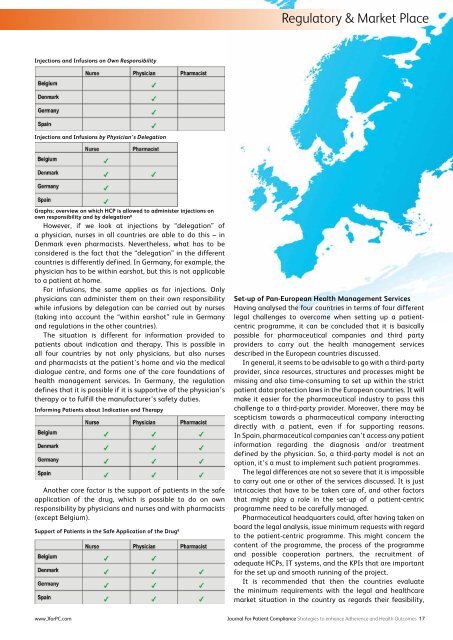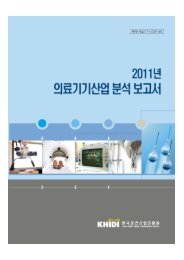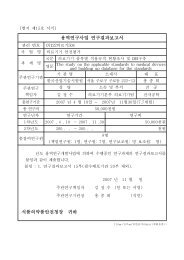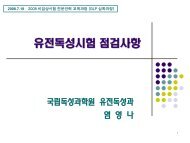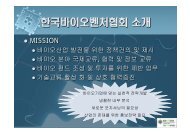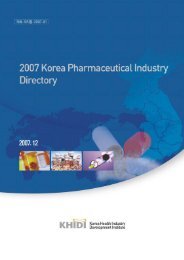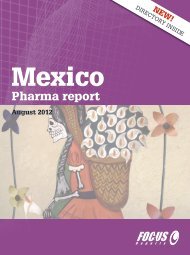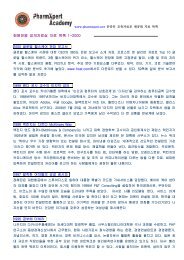Regulatory & Market Placecentric service in reality foresees that the patient is onlyinformed about the patient-centric service after a producthas been prescribed by a physician, the promotional senseof this service is already negated in the first place. It must,however, be ensured that the nurse or HCP is well trained tonot “promote” the product at the patient’s home in any way.Graph: possible way of approaching the patient for a patient-centric programmeIn order to NOT trespass on the promotional factor thatthe information on the programme could have, it is thereforeadvisable to use the pharmaceutical company’s own salesforce, or that of a third party, to inform the physicians and/ or pharmacists about the programme, who then in turninform the patients after prescription of the product.Concluding that no promotional support of the drug ispossible as the patient-centric programme only starts whenthe patient is already on the drug following the prescriptionof the physician, the ways in which the patient can beaccessed shall now be analysed.We have already seen that patients can be informed bythe treating physician about a patient-centric programme ifthe product has already been prescribed to the patient andthe information is non-promotional as regards the product.However, is there any supporting way to access the patientfor a programme? There seem to be alternative ways!In Germany, Denmark and Belgium, for example, packageinserts as regards the programme, and also flyers or brochuresat the physician and / or at the pharmacy, can be used inorder to inform about the patient-centric programme (onlyafter the product has been prescribed).Moreover, the pharmacist could also be used in order totransfer the message of the patient-centric programme tothe patient. In Spain, the optimal and legal way to approachthe patients would also be via the physicians, and nonpromotionalmaterials can be used as discussed above.If the Patient can Successfully be Approached and isHappy to Join the programme, the Question of PatientConsent comes into PlayIn all of the four countries, the patient has to provide consent! 4Except for Denmark, in the three other countries, contact withthe patient has to be in writing. It should also be possible toexpress consent via registration on a homepage.In Denmark, even if it is not mandatory to receive theconsent in writing, it is definitely recommended to do so inorder to avoid any doubt.According to Article 5 of Organic Law 15/1999 in Spain, thepatient whose personal data are collected must previously beinformed, in an express, precise and unmistakable way, of thefollowing matters:• Of the existence of a personal data filing system or theprocessing of personal data, of the purposes of thecollection of the personal data, and of the recipients of theinformation;• Of the mandatory or optional character of his or herresponse to the questions asked;• Of the consequences of the collection of the data or of therefusal to provide the data;• Of the possibility to exercise at any time the rights ofaccess, rectification, cancellation and opposition;• Of the identity and address of the processor, or, if applicable,of its representative.In Denmark, with the consent of the patient, healthcarepersonnel can pass on information about the patient health,private information, or other confidential information toother healthcare personnel. Moreover, physicians who aretreating a patient are then, in the case of a patient-centricprogramme, allowed to obtain information about a patient’shealth, private information or other confidential informationfrom electronic systems when it is necessary in connection toan ongoing treatment of the patient from the HMS nurse 5 .In Germany and Belgium, moreover, there has to be writtenconsent by the patient to store and process his/her data. Thepatient data has to be separated from the pharmaceuticalentrepreneur. The staff involved in the project have to beinstructed about data protection 6 .Under no circumstances should the reporting to thepharmaceutical manufacturer, or a third party involved inthe programme, include any personal data or any medicalpersonal data, but only anonymous data.Which Tasks can be Performed at Home for Patients by anHCP in the Framework of a Health Management Service?After having passed the three challenges prior to the beginningof the programme, it is indispensable to know what tasks andinterventions can be performed with the patient at home bya nurse (we assume that it is a nurse who visits the patient athome. If it is another HCP, the facts might be different).In Germany, for example, nurses are allowed to informthe patient at home about the disease, treatment and theapplication of a product as well as to show the patient howto use the product; they are not allowed to set infusionsor injections themselves at home of a patient due to theregulations of the BÄK (Bundesärztekammer = Federalmedical council) – a physician would have to be withinearshot 7 . As outlined in point number one, they are notallowed to promote the product in any way, but only toneutrally discuss it and its usage.It has to be taken into account, however, that in Spain, forinjections and infusions, the home-setting scenario can onlybe fulfilled if the use of the product has not been restrictedto the premises of the hospital. If this is the case, the nurse isallowed to carry out injections and infusions.In all of the countries, no other HCP (except an alternativepractitioner for OTC drugs in Germany) other than a physiciancan carry out injections into the patient on own responsibility.16 Journal For Patient Compliance Strategies to enhance Adherence and Health OutcomesVolume 2 - Issue 4
Regulatory & Market PlaceInjections and Infusions on Own ResponsibilityInjections and Infusions by Physician’s DelegationGraphs: overview on which HCP is allowed to administer injections onown responsibility and by delegation 8However, if we look at injections by “delegation” ofa physician, nurses in all countries are able to do this – inDenmark even pharmacists. Nevertheless, what has to beconsidered is the fact that the “delegation” in the differentcountries is differently defined. In Germany, for example, thephysician has to be within earshot, but this is not applicableto a patient at home.For infusions, the same applies as for injections. Onlyphysicians can administer them on their own responsibilitywhile infusions by delegation can be carried out by nurses(taking into account the “within earshot” rule in Germanyand regulations in the other countries).The situation is different for information provided topatients about indication and therapy. This is possible inall four countries by not only physicians, but also nursesand pharmacists at the patient’s home and via the medicaldialogue centre, and forms one of the core foundations ofhealth management services. In Germany, the regulationdefines that it is possible if it is supportive of the physician’stherapy or to fulfill the manufacturer’s safety duties.Informing Patients about Indication and TherapyAnother core factor is the support of patients in the safeapplication of the drug, which is possible to do on ownresponsibility by physicians and nurses and with pharmacists(except Belgium).Support of Patients in the Safe Application of the Drug 9Set-up of Pan-European Health Management ServicesHaving analysed the four countries in terms of four differentlegal challenges to overcome when setting up a patientcentricprogramme, it can be concluded that it is basicallypossible for pharmaceutical companies and third partyproviders to carry out the health management servicesdescribed in the European countries discussed.In general, it seems to be advisable to go with a third-partyprovider, since resources, structures and processes might bemissing and also time-consuming to set up within the strictpatient data protection laws in the European countries. It willmake it easier for the pharmaceutical industry to pass thischallenge to a third-party provider. Moreover, there may bescepticism towards a pharmaceutical company interactingdirectly with a patient, even if for supporting reasons.In Spain, pharmaceutical companies can’t access any patientinformation regarding the diagnosis and/or treatmentdefined by the physician. So, a third-party model is not anoption, it’s a must to implement such patient programmes.The legal differences are not so severe that it is impossibleto carry out one or other of the services discussed. It is justintricacies that have to be taken care of, and other factorsthat might play a role in the set-up of a patient-centricprogramme need to be carefully managed.Pharmaceutical headquarters could, after having taken onboard the legal analysis, issue minimum requests with regardto the patient-centric programme. This might concern thecontent of the programme, the process of the programmeand possible cooperation partners, the recruitment ofadequate HCPs, IT systems, and the KPIs that are importantfor the set up and smooth running of the project.It is recommended that then the countries evaluatethe minimum requirements with the legal and healthcaremarket situation in the country as regards their feasibility,www.JforPC.comJournal For Patient Compliance Strategies to enhance Adherence and Health Outcomes 17


